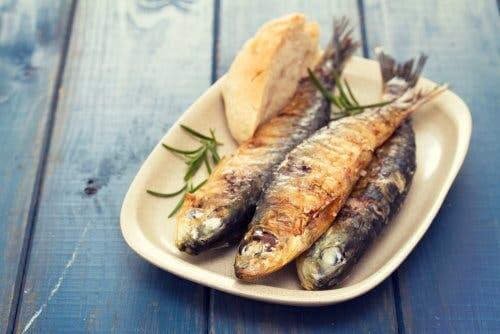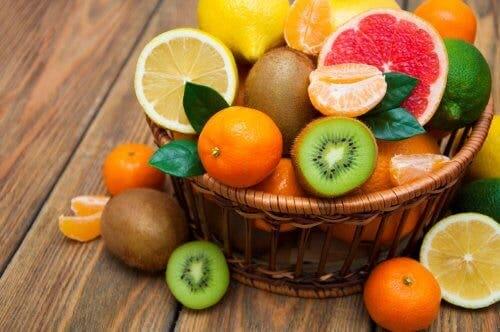Satiating Diet: Lose Weight Without Going Hungry

More and more people are becoming aware of the importance of good food choices in order to maintain good health. A satiating diet is a good option for people who want to lose a few pounds.
Satiating foods are those that allow you to keep the feeling of a full stomach for longer. Controlling this feeling is a very serious issue if you want to lose weight.
Making the proper food choices will cause you to have fewer hunger pangs between meals. Therefore, it’s important you know what a satiating diet is and how to follow it.
On the other hand, many people already go to both endocrinologists and nutritionists in order to establish a suitable diet plan for their body to feel better and avoid problems caused by poor diet, without the goal of losing weight or gaining muscle mass.
Whatever the case, this satiating diet is ideal both for losing weight and for having good health, since it will help you lose weight without starving, due to the foods included in it.
Characteristics of satiating diet foods

In the first place, they’re usually foods rich in protein, since that’s the nutrient that most helps to increase the feeling of satiety and prevent hunger. In addition to this, proteins promote fat burning. Therefore, it’s important to include them in moderation in your diet to lose weight.
Fiber-rich foods are also very satiating. Fiber captures nutrients from food and holds them longer in the intestines before you digest them. In addition to this, fiber also absorbs water and increases its size. As a consequence, it keeps you feeling full longer.
On the other hand, other foods characterized by their ability to satiate are those that are large or with a high volume but low in calories. For example, green leafy vegetables or fruits.
For this reason, it’s important to eat whole food, don’t blend it or make smoothies. Liquids are less satiating and are absorbed faster than whole pieces because you don’t have to digest them as much.
Finally, foods that have a lower glycemic index help maintain normal blood glucose levels. As a consequence, your appetite is better regulated too.
With all this, we’ll show you some foods that have some of these characteristics and are ideal to include in your satiating diet.
Read also: Fruits That Accelerate Weight Loss
Fish

Both white and fatty fish are very satiating foods, since they have a high protein content.
As for white fish, such as hake, roosterfish, or cod, they’re characterized by their low fat content and high-quality protein content. They’re light but very satiating fish, making them ideal for keeping hunger at bay.
On the other hand, fatty fish, such as salmon, bonito, or tuna, contain more calories but provide a greater portion of quality protein and healthy fats. Therefore, although they have more calories, they are equally satiating and recommended for weight loss and good health.
You might be interested in reading: Mercury in Fish: Should You be Concerned?
Eggs
Eggs are a highly nutritious food that should be part of your regular diet. Although they don’t provide fiber, the protein contained in the egg is a standard that we can use to compare nutritionally to other proteins in other foods.
They have fat-free proteins, so they make you feel full and also offer healthy mono and polyunsaturated fats for your body.
Fruits and vegetables in a satiating diet

A healthy and balanced diet should contain at least five fruits and vegetables. Some are more satiating than others, such as those with a high water content.
Watermelon, for example, is made up of more than 90% water, so it will make you feel full. Likewise, grapefruit is also a very satisfying fruit. In addition, it provides antioxidant effects.
On the other hand, both bananas and apples have more calories than the other two mentioned, but they will keep you from feeling hungry for a longer time. For this reason, they’re ideal for breakfast or a snack in a satiating diet.
All cited sources were thoroughly reviewed by our team to ensure their quality, reliability, currency, and validity. The bibliography of this article was considered reliable and of academic or scientific accuracy.
- Warrilow A., Mellor D., McKune A., Pumpa K., Dietary fat, fibre, satiation, and satiety a systematic review of acute studies. Eur J Clin Nutr, 2019. 73 (3): 333-344.
- Calder PC., Omega 3 fatty acids and inflammatory processes: from molecules to man. Biochem Soc Trans, 2017. 45 (5): 1105-1115.
- Aune D., Giovannucci E., Boffetta P., Fadness LT., et al., Fruit and vegetable intake and the risk of cardiovascular disease, total cancer and all cause mortality a systematic review and dose response meta analysis of prospective studies. Int J Epidemiol, 2017. 46 (3): 1029-1056.
This text is provided for informational purposes only and does not replace consultation with a professional. If in doubt, consult your specialist.








